Wild Sport & Camaraderie in Remote Bulgaria
July 15, 2020



 Hunting,SCA Articles
Hunting,SCA Articles
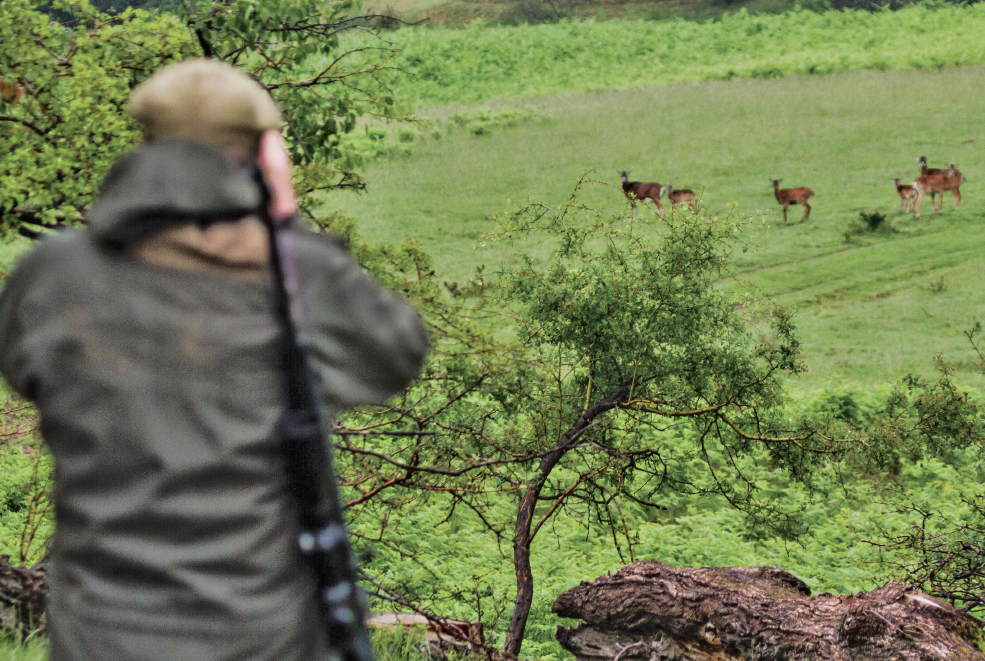
Few experiences are as memorable as hunting with a close friend in a distant country.
Photography by Tweed Media
Someone once said to me, “An experience shared is an experience doubled.” To my mind, no truer statement could be said of hunting. The situations and adventure I’ve experienced have been far better shared at the time than passed on long after the event. It is never the same explaining something a second or third time without the detail and context that surrounds a hunt.
It’s not just the hunting I have enjoyed sharing; the periphery to the main event also has benefitted from being jointly experienced. Local people and their customs, the culture, the cuisine, flora and fauna, not to mention a celebratory drink after a successful hunt—all have been better when together with someone.
I am privileged to hunt several times a year with my close friend Oliver Dorn. Although from different countries and cultures, myself the U.K. and Oliver Germany, our appetite for hunting experiences is particularly well matched. We share a genuine passion for many of the same game species, and what differences we do have make for some excellent conversation over a post-hunt dinner—whatever the local dish may be. We have hunted together multiple times in Germany, England, Scotland, once in Austria and most recently in Namibia in 2017.
Our hunting philosophy, though born from different hunting traditions, is identical. This could be summarized as ethical, fair-chase hunting from sustainable game populations—nothing more, and certainly nothing less.
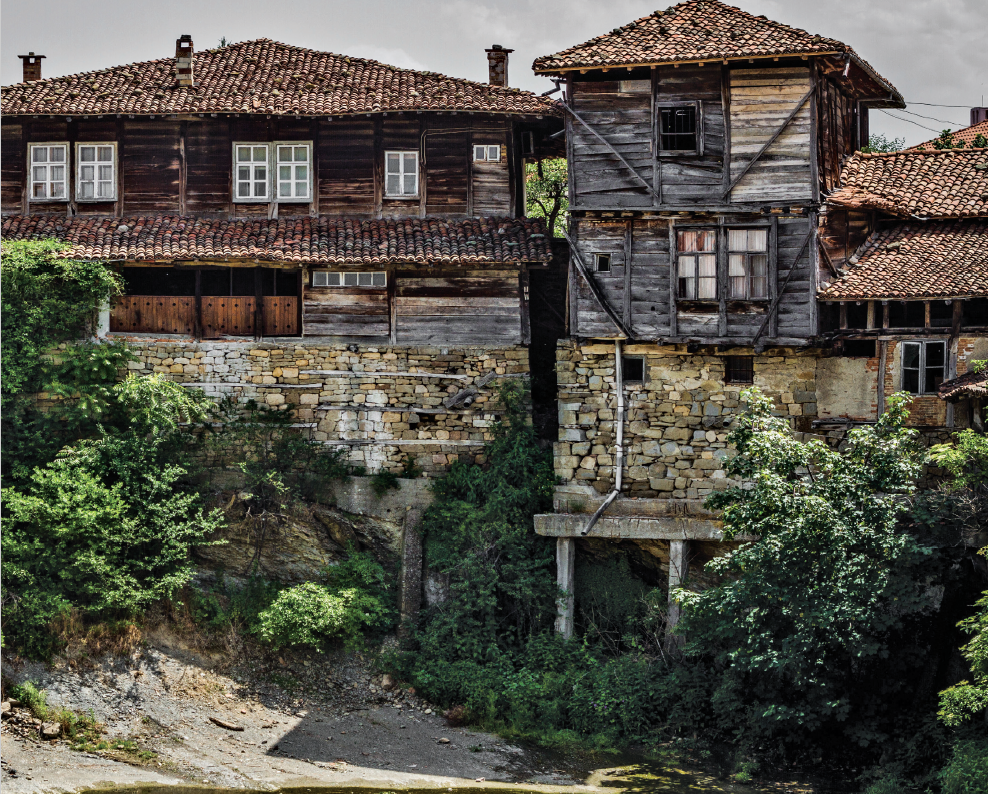
This philosophy made a hunting trip in Bulgaria an easy choice for both of us. We heard great things about the country from a number of hunters whose opinions are to be taken seriously: the quality of the animals, the beauty of the countryside and how noncommercialized this one-time communist state is as a top-end hunting destination.
Situated in the Balkans with the Black Sea to the east, Bulgaria is a gateway to mainland Europe from Turkey, which over the centuries has left its cultural mark. Like many of its Balkan neighbors, Bulgaria was a communist state following World War II and remained so until the fall of the Berlin Wall in 1989. The country has undergone a painful and protracted transition to a thriving market economy since the end of communist rule.
Having joined the European Union in 2007, Bulgaria is the poorest country within the bloc. As a result, Bulgaria embraces foreign hunters and the riches they bring. Every Bulgarian we met was incredibly warm and pleasant, and we were made to feel at ease regardless of the obvious communication difficulties.
Democracy brought about many changes in Bulgaria. Directly after communist rule ended, the country was sent into a state of flux. Some of the poorer and more remote rural communities were pushed to borderline poverty during this period. Sadly, this had an adverse impact on wild game, which became necessary for sustenance and survival. In many places the game was decimated, particularly the mouflon. Some 14 years later, enhanced by a better understanding of the economic benefit of hunting, Bulgaria is host to most of Europe’s large game species.
Oliver and I flew from Frankfurt and London, respectively, with a plan to meet in Sofia, Bulgaria’s capital city. Bulgaria is only two and a half hours from the U.K. and just over two hours from Frankfurt, making it highly accessible to the growing number of European sportsmen and women willing to travel for an exotic hunting adventure.
When flying with rifles to foreign destinations, it’s normal to collect them from customs or the airport police once you arrive. To see my rifle case arriving proudly on the baggage carousel at Terminal 2 in Sofia next to a pushchair was quite a surprise. Having swiftly liberated my rifle from this strange situation, I was met by an interpreter who had been organized by our highly acclaimed French outfitter, Joel of Espace Chasse. Having use of an interpreter made me feel more like a BBC war correspondent than a hunter, but Bulgarian is a tricky Slavic language, so assistance with communications was more than necessary.
Oliver flew in an hour after me, and we met with no complications. I even had time to sample a local beer with my new Bulgarian friend.
Our transfer consisted of a four-hour drive eastward to the ground we would be hunting. Soon after leaving the airport, both Oliver and I were amazed to see sporting firearms being advertised on mammoth billboards next to the motorway. We could hardly imagine this on a German autobahn or British motorway, but we were pleased to see Bulgaria’s support of hunting. We also enjoyed looking at some breathtaking views of tree-clad mountains cut by deep, dark gorges. As we gazed into the depths of the forests, we pondered what beasts might be lurking in them. With some excited conversation about the four days ahead, the journey passed quickly.
We arrived at the privately owned Bukovetz hunting estate to a warm reception. The impressive lodge and associated buildings are nestled at the bottom of a valley next to a lake surrounded by ancient forests in a simply spectacular setting. The estate covers some 30,000 hectares of unspoiled countryside in the central Stara Planina mountain range in Veliko Tarnovo province. Our hosts cheerfully greeted us with local schnapps and some freshly baked bread, a traditional welcome to their hunting ground.
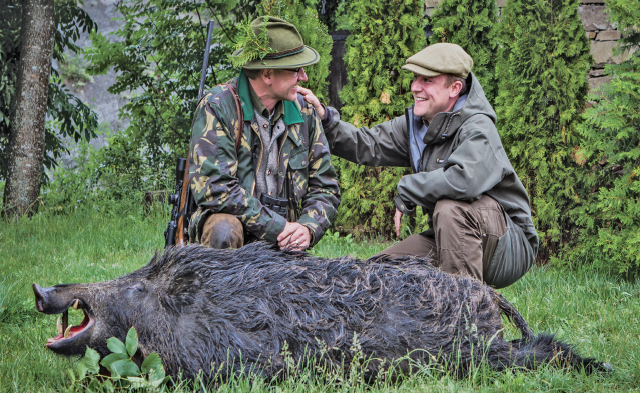
Bukovetz is famed for the enormous wild boar found there. The estate harvests about 200 trophy boars each year, and the world record was reportedly taken in Bulgaria. The Bukovetz guests regularly take large keilers weighing in excess of 250 pounds.
My personal desire, more than taking a large boar or a handsome roebuck, was to hunt a representative mouflon ram. I had already hunted rams in two other countries, both times unsuccessfully. My last mouflon encounter was six months before on top of a mountain in the French Alps in waist-deep snow. I was hunting in a savage ice storm; in fact, the worst my guide had ever hunted in. Suffice it to say, I shot at but cleanly missed a decent mouflon ram. That situation was one I’d relived many times since…and one I did not wish to repeat!
The Bukovetz estate had been under private ownership for 12 years. Over this period, a strategic wildlife management plan had been deployed to nurture wild game populations, rehabilitate the ecosystem and bring back a natural balance. Five years prior, the estate received permission from the Bulgarian government to reintroduce mouflon from foreign bloodlines. This effort has been so successful that mouflon rams can now be hunted in Bukovetz year-round, which is not the case in most other EU countries.
On our first day at Bukovetz, we decided that an evening stalk for roebuck would help to familiarize us with our surroundings. As darkness fell, neither of us had managed to shoot a buck, but we both had close encounters with wild boar that had raised our excitement levels for what was to come.
The food at the Bukovetz lodge was first class. While enjoying our meal, Oliver and I discussed our first hunt in Bulgaria: the ground, the scale of the forests, the number of tracks, the feed areas, how well organized everything was and the sheer beauty of the Bulgarian mountains.
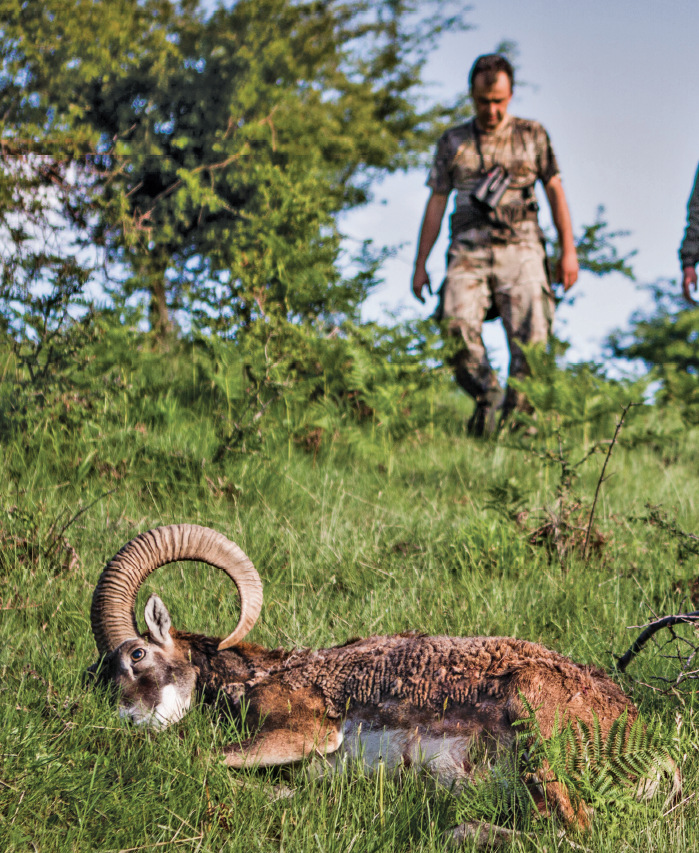 The next morning, with not enough sleep, we chose to pursue roebuck after having been thrown a challenge by the species the previous evening. I was lucky enough to see and shoot a suitable six-point buck early on. After my shot, the animal ran 80 yards down a steep slope into some thick vegetation, where it took us several hours to find the dead animal.
The next morning, with not enough sleep, we chose to pursue roebuck after having been thrown a challenge by the species the previous evening. I was lucky enough to see and shoot a suitable six-point buck early on. After my shot, the animal ran 80 yards down a steep slope into some thick vegetation, where it took us several hours to find the dead animal.
I could not wait to tell Oliver about my experience and to find out whether he had managed to take one. On our return to the hunting lodge, I could see him standing over another beautiful six-point buck laid out on the grass. Our happiness over a job well done was mutual and had gotten our trip off to a gratifying start.
Our attention now focused on the species we came for. Oliver’s concentration was fixed firmly on a grand keiler, while I hoped to finally catch up with a mouflon ram. The weather was not on our side: thunderstorms, rain and strong, gusty winds were forecast for the rest of our trip.
That evening, while looking for a ram in the heavy rain, the guide and I saw a group of 30 mouflon just inside an ancient beech woodland, but no rams. We spotted a few more animals on the skyline, but again, no mature males. Weather aside, the scenery was jaw-droppingly beautiful. It was amazing to be hunting in an environment that was a living facsimile of how the whole of Europe appeared several hundred years ago, before many of its forests were felled.
On our hour-long drive back to the lodge, I wondered if Oliver has managed to get his keiler. I dropped my equipment off and headed straight for dinner, where Oliver told me he had taken a “confident shot” at a large boar in the darkness. There was no blood, and they had not recovered the beast. To me, this is a nightmare scenario in which my mind replays everything about the shot, the distance, the lighting and the animal’s reaction, but I listened to Oliver’s exact details, and the situation sounded positive. We would not find out until the morning, but talking about it clearly helped him finally get some sleep.
Early again the next day, I left for the mountains in pursuit of a ram. Oliver went for a roebuck, but deep down, I knew he could only focus on his keiler and whether it would be located. The weather was terrible, and we both came back soaked and emptyhanded. I sympathized with Oliver’s emotion, having been in the same situation before.
Then, our guides who had gone to look for the boar arrived with a happy payload. A simply magnificent keiler with eight-inch tusks was resting in the back of a pickup. This was the largest boar he had ever taken, and the shot had been perfect. The keiler had died just a few yards from where it was taken. Oliver was delighted, but so was I, having understood and shared his emotional roller coaster.
The sun came out that afternoon, and I hoped my luck would change. Scanning across some open glades with my lightweight 10×42 binoculars, we saw six males basking in the sun. Using the wind to our advantage, we approached to within 50 yards.
The gang of cud-chewing mouflon was lying in a small depression similar to a golf bunker. Some swirling wind gave us away, the mouflon scrambling to their feet, but my guide had already identified the biggest male. Zooming my scope out to give me the widest field of view, I took aim on the horned beast but had to wait until the others moved aside.
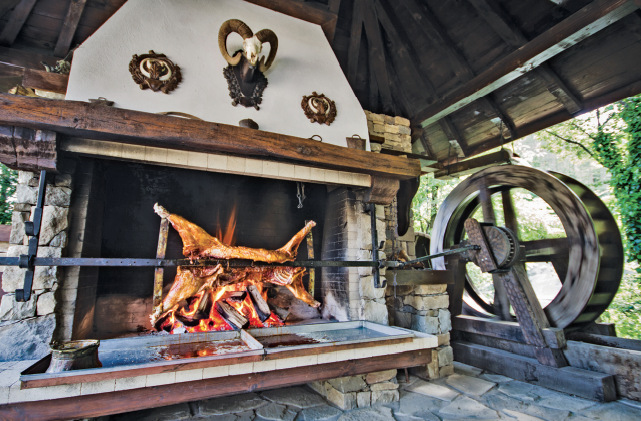 After my shot, the mouflon ran about 50 yards before dropping. I had finally managed to take a handsome 5-year-old with 28-inch horns. My satisfaction was immense, especially given the adverse conditions we had endured for three days, let alone the two previous trips I had been on. I could not wait to tell Oliver I had finally gotten a mouflon. He was, of course, delighted for me, and we jointly celebrated our hunting success that evening while we ate spit-roasted wild boar that had been turned by a watermill. Our Bulgarian experience had been immensely rewarding in all aspects of hunting, adventure and friendship.
After my shot, the mouflon ran about 50 yards before dropping. I had finally managed to take a handsome 5-year-old with 28-inch horns. My satisfaction was immense, especially given the adverse conditions we had endured for three days, let alone the two previous trips I had been on. I could not wait to tell Oliver I had finally gotten a mouflon. He was, of course, delighted for me, and we jointly celebrated our hunting success that evening while we ate spit-roasted wild boar that had been turned by a watermill. Our Bulgarian experience had been immensely rewarding in all aspects of hunting, adventure and friendship.
Of all the European destinations I have hunted, Bulgaria is now firmly a favorite. There is an un-manicured rawness and visceral quality to it, which is of major appeal. I will most definitely be going back again in the winter, hopefully with Oliver or another of my hunting companions.
Once again, I realized that the natural ups and downs, successes and failures of a hunting trip are far better shared. When hunting with a companion, it is as though hunts combine to double the satisfaction when something goes well, but perhaps even more importantly, sharing the experience halves the disappointment if something does not. I can’t imagine going on a hunting trip alone for this very reason, and the more like-minded people I can have the pleasure of hunting with, the better.
